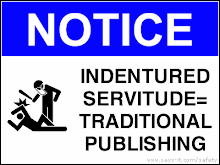Status: On Vacation; sick with bronchitis--may have to extend my time off further to get over this
Doing: Writing this blog; surfing the net; answering e-mails
Watching: "Pitch Black"; CBS Evening News
Listening to: Nothing at the moment.
Reading: Kushiel's Scion by Jacqueline Carey (Page 173)
TOPIC: WHAT GOOD IS A TRADITIONAL PUBLISHER?
Something that I've been trying to get my points across for the last few years: That traditional publishing isn't as cracked up as it looks. And while the author of this article still vouches for mainstream; I am still strongly advocating that you always keep your options open.
A colleague recently put this question in the bluntest of terms: "If publishers won't promote your book and they take a huge percentage, what exactly do they do for the author?"
I wouldn't say that publishing houses won't promote your book, but first-time authors get a very small piece of the marketing pie-and publishers have smaller marketing budgets than they used to.
They have smaller everything budgets than they used to, which means less personal attention, and that's one reason someone could legitimately ask: "Well, what good are they, then?"
Another reason is the increasing availability of print-on-demand technology and self-publishing resources. No longer does a would-be self publisher have to start a publishing business and spend thousands of dollars to get into print. Authors have more options than they did 20 years ago.
For many non-fiction authors (and even some novelists), self-publishing and POD are valid options. There's no question that authors who use these methods of publishing get to keep more of the book's cover price. And there are still a number of small, independent presses out there who provide more support to their authors because they take on only a few books each year.
But there are still some advantages to getting your book published by one of the giants. They know what sells before you can get your book published, you have to submit a proposal with an outline of your book and a marketing plan. Acquisitions editors at the big houses know what's selling and what isn't.
If you get repeated rejections which all cite the same problems, it's a sign that you need to retool your idea before you go to all the trouble of writing the book. And if they accept your proposal, it's because they believe there's a large enough market for your book to justify their investment in producing it.
They pay in advance.
Admittedly, the advance you get for your first book isn't likely to allow you to quit your day job, since it's likely to be in the low five figures. And it doesn't arrive the minute you sign the contract, either. But that money can cover many of the costs associated with writing and marketing the book, such as travel for research, a local direct mail campaign, or the services of a ghostwriter.
They have more resources.
When you self-publish or use a POD house, you have to locate, and pay for, all kinds of professionals, or spend extra time doing the many jobs of publishing yourself.
You may be the top expert in your field and a good writer on top of it, but creating a book also requires copyediting, book design, typesetting (though no actual type is involved anymore), proof reading, and cover art, among other things.
Large publishers already have all these people either on staff or working for them as contractors, and they've had decades to learn things like which fonts are most readable and how much white space you need on a page.
Many POD houses offer editing, book layout, and cover design services, but they charge you for them. If you're truly self-publishing, you have to find and pay all these people yourself, in addition to your actual printing and shipping costs. (And much as I admire self-publishing guru Dan Poynter, I don't hold with his theory that you can use clip art for your book cover and still look professional.)
They get you into bookstores.
Very few self-published authors can get their books onto the shelves of large chain bookstores like Barnes and Noble and Borders. These companies have strict policies about which distributors they deal with and require return policies which no sane person would stand for.
And, of course, if a chain won't carry your book, it's not likely you'll be able to hold an author event there. What's more, the publisher takes care of shipping extra copies of your book to thestore when you do the signing, so you don't have to drag books around with you. (You do have to notify them that you're doing the event and ask them to send the books.)
Publishers also have booths at major publishing conventions like Book Expo America. Your book might not get star billing, but they'll be pushing all their new titles.
So yes, traditional publishers do still provide their authors with valuable services. And the "huge percentage" they take rarely amounts to a huge profit: It goes to covering their very considerable costs in preparing, printing, and distributing your book (not to mention offering those killer return policies to thebookstores).
Despite the increasing ease and respectability of self-publishing, pitching your book to Random House or HarperCollins may still be your best option.
Not your typical writer's blog.
Support your local author! ^_^
About Me

- Schuyler Thorpe
- Married 6 years. Have plenty of pets--as substitutes for the kids until the day they are born. Though I was born with cerebal palsy, I don't let that slow me down or stop me.